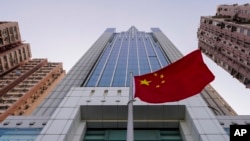China will take charge of “serious” cases in Hong Kong that breach national security, a senior Chinese official said Tuesday as Beijing prepares to impose new national security laws in the city.
Analysts and legal experts say Hong Kong’s freedoms are under unprecedented threats after China’s parliament, the National People’s Congress, passed a plan in late May to impose sweeping national security laws on Hong Kong to prevent and punish what Beijing considers “acts and activities” that threaten national security, including advocacy of secession, subversion and terrorism and foreign interference.
The plan, which bypassed Hong Kong’s legislature, would also allow Chinese national security organs to set up agencies in the city. The laws are expected to be enacted within the next few months, with some reports suggesting it could take effect as soon as late June or July.
China insists such laws are necessary to halt widespread anti-government protests in Hong Kong, which started off being peaceful in June last year but turned violent as frustrations mounted.
Deng Zhonghua, deputy head of China’s ministerial-level Hong Kong and Macau Affairs Office, told an official conference on Monday that the majority of the work to safeguard national security, including law enforcement and judicial process, should be done by Hong Kong’s authorities. But “in very special circumstances, the central (Chinese) authorities should have the power to retain jurisdiction over offenses in Hong Kong that seriously endanger national security,” he added.
Deng stopped short of defining what constitutes “serious” cases but insisted that such cases would be “very few” and would not affect the independence of the semi-autonomous city’s judiciary. He however stressed that the Chinese government must have an “actual grip” on national security offenses in Hong Kong.
“(The laws) must create an effective deterrence, instead of just being slogans and gestures,” Deng said.
He further stressed that the national security laws “have the authority and status that cannot be challenged” and no local laws in Hong Kong should override them.
He said Chinese security agencies will also “supervise and guide” the Hong Kong government in safeguarding national security.
In his original address, Deng said the national security laws would give national security agents set up by the Chinese and Hong Kong authorities' enforcement and judicial powers. But the word “judicial power” disappeared from his speech released after the conference.
Willy Lam, an adjunct professor at the Chinese University of Hong Kong, said Deng’s speech was “very disturbing because it's up to Beijing to define what is serious and what cases need special treatment.”
“It will be determined according to Beijing’s yardstick and this goes against the principle of the rule of law,” said Lam. “This is very dangerous.”
Johnny Lau, a veteran political commentator on Chinese affairs, said although the Chinese authorities have repeatedly emphasized that the national security laws would apply to only “a small bunch” of people, “the laws would likely be used to justify suppressing not so few government critics in Hong Kong”, where people have enjoyed a range of civil freedoms that would soon be deemed illegal under the national security laws.
Johannes Chan, professor of law at the University of Hong Kong, told local media Deng’s words on the “unchallenged authority” of the national security laws could mean they supersede Hong Kong’s mini-constitution, the Basic Law, and its laws which have mechanisms to safeguard human rights. He worried that Hong Kong courts would effectively become “rubber stamps” that execute the national security laws, without the authority to challenge and interpret them.
Philip Dykes, the chairman of the Hong Kong Bar Association said Beijing's intention to take control of the most serious national security cases amounts to a "reverse engineering" of a now withdrawn extradition bill which sparked the huge, year-long anti-government protest movement. The proposed law, which could see individuals sent to China for trials, plunged the city into its deepest political crisis in decades.
"It sounds like a reverse engineering of the ill-fated extradition bill. Rather than you going to the mainland, the mainland comes to you," Dykes told the public broadcaster RTHK.
Experts have said the national security laws have sounded the death knell for the “one country, two systems” policy that has enabled Hong Kong to maintain its core values -- the rule of law and basic civil liberties -- that have underpinned its success as an international business hub in the past 23 years after its reversal from British to Chinese rule.
Hong Kong’s Secretary for Security John Lee also said this week a new police unit being created to implement the national security laws will operate secretly because national security is involved. He also said Tuesday that the new laws will stipulate what politicians are barred from doing when they meet foreign government officials. Pro-democracy politicians have often been criticized by China for “inviting foreign interference” when they discuss Hong Kong with foreign officials.
